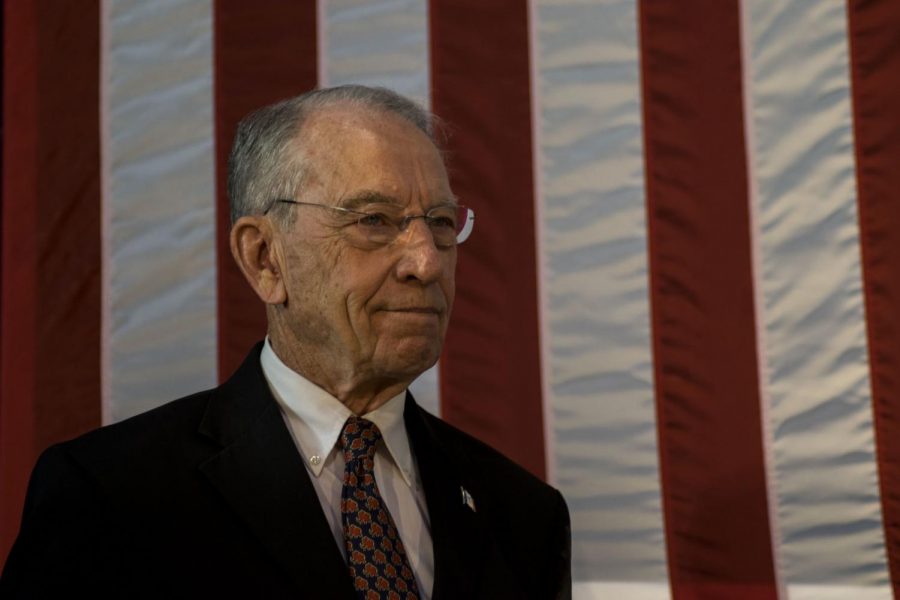Sen. Chuck Grassley reacts to Chauvin verdict, speaks on Congress’s role in police reform
On Tuesday former police officer Derek Chauvin was found guilty of all charges. In an address to the nation, President Joe Biden encouraged the Senate to pass the George Floyd Justice in Policing Act.
Sen. Chuck Grassley, R-Iowa, stands on stage at the Second Annual Harvest Festival on Saturday, Oct. 13, 2018. He serves as the Chair of the Senate Judiciary Committee.
April 21, 2021
In a conference call with reporters on Wednesday, Sen. Chuck Grassley, R-Iowa, said he expects the guilty verdict of Derek Chauvin to be a catalyst for lawmakers to make police reform a priority in Congress.
“I think there’s clearly an appetite on both sides to address legitimate issues about policing in America,” Grassley said.
On Tuesday, a jury found Chauvin, a former Minneapolis police officer, guilty of second-degree murder, third-degree murder, and second-degree manslaughter in the death of George Floyd. While many activists and politicians were pleased with the verdict, they said the result of this one case was not enough and was only one part of the fight for racial justice.
President Joe Biden and Vice President Kamala Harris addressed the nation on Tuesday night and encouraged Congress to pass the George Floyd Justice in Policing Act. The bill was initially introduced to the U.S. House in June 2020 where it passed but never voted on in the Senate when Republicans held the majority. The act, H.R.1280, was reintroduced to the House this congressional session in February, where it passed in March. It was received in the Senate March 9, but there has been no action on the bill since.
Grassley said he thinks passing that specific bill will be difficult. The bill increases accountability for officer misconduct, limits qualified immunity as a defense against liability in a private civil action against officers, and creates a national registry for information about police misconduct. It also restricts the use of no-knock warrants, chokeholds, and carotid holds and limits unnecessary use of force.
Grassley supported a bill last summer from Sen. Tim Scott, R-South Carolina that aimed to increase transparency, accountability, and education in policing. Senate Democrats blocked a vote on the bill, saying it didn’t go far enough, particularly on the issue of qualified immunity.
Grassley said he’s willing to look at proposals that limit qualified immunity, but said he doesn’t want police officers to always be nervous about a potential lawsuit while they are on the job.
“It accomplished 70 percent of what a Democrat bill might try to accomplish,” Grassley said of Scott’s S.3985 – JUSTICE Act. “So the rationale was they should have passed it easily last summer, because if you agree on 70 percent of a bill, you’re never going to get agreement on 100 percent of a bill, so why don’t we do what we can do and then do more later? But Democrats wouldn’t go along with that … Now this is a different environment and different Congress, and who knows what can be worked out when people sit down and start to talk about it and I think they will, I’ll be glad to be there.”
Grassley also spoke on the Growing Climate Solutions Act, a bipartisan bill which he and Sen. Joni Ernst, R-Iowa, are cosponsoring. The lead sponsors of the bill are Agriculture Chairperson, Sen. Debbie Stabenow, D-Michigan, and Sen. Mike Braun, R-Indiana.
The bill would create a certification program at the U.S. Department of Agriculture, help farmers and forest landowners interested in entering into carbon credit markets, address technical entry barriers and provide access to reliable information about the carbon markets for farmers.
“The common sense bill that will support responsible farming efforts. It’s quite timely as tomorrow is Earth Day,” Grassley said. “Farmers have proven to be a part of the solution to climate change and this bill builds on their successes.”



